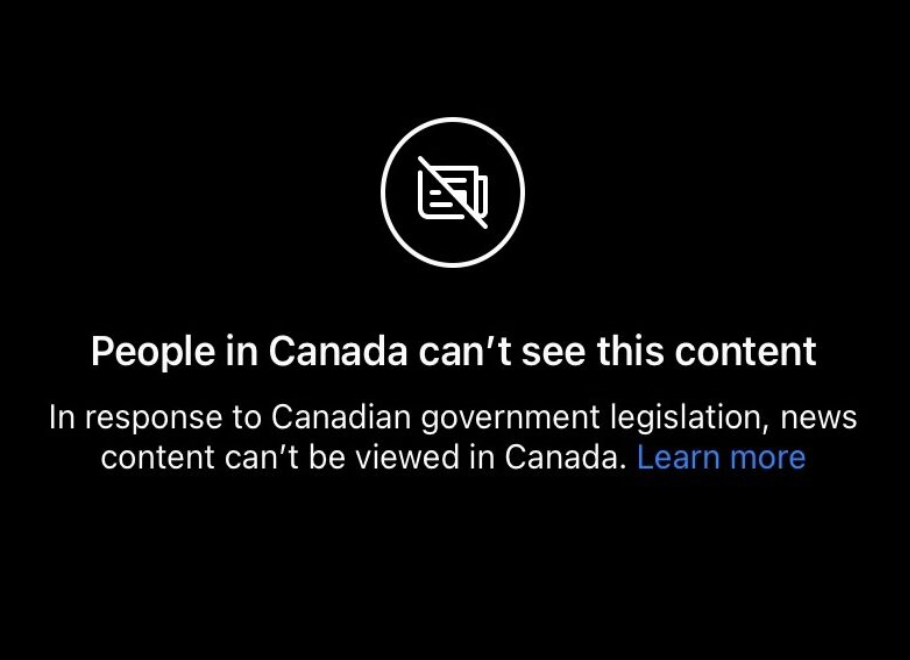An update from the Martlet, five months after Meta’s block

Screenshot via Instagram.
Chances are, if you’ve tried to access the Martlet’s Instagram or Facebook in the last five months, you’ve run into a message reading “People in Canada can’t see this content.”
On Dec. 19, the legislation that spurred this news blockade from Meta will take effect for good, and we at the Martlet are wrought with trepidation.
Bill C-18, the Online News Act, has been creating palpable tension in most newsrooms since the legislation received royal assent in June. The bill, heralded from an Australian bill of the same nature, is intended to champion fair pay to journalists and news media outlets for their labour by charging websites like Instagram and Google each time a news link is shared on their platform.
Its actual effect for many newsrooms has been less than constructive. As a result of their dissatisfaction with the bill’s terms, Meta, the parent company of Instagram and Facebook, has barred Canadians from accessing news through their social media platforms.
Now, leading up to Dec. 19, the fate of Canadian news media is especially on our minds at the Martlet. Google had previously expressed their opposition to its regulations, raising a number of concerns about the legislation’s terms.
On Nov. 29, Google and the government came to an agreement which will mean that Google will pay Canadian news media outlets as implored by the bill.
Following this news, small outlets who were fearing a double affront to accessibility — blockage on Meta and Canada’s favourite search engine, Google — can relax. But Google’s cooperation with the bill does nothing to remedy the continuous damage being done by Meta’s block.
In the months since Meta’s initial response to the bill was introduced, the Martlet’s readership has decreased, both because readers are no longer accessing our website through social media like they used to, and because, for many former readers, our lack of digital presence seems to mean out of sight, out of mind.
Meta blocked news for Canadian users in the summer, which is when traffic to the Martlet’s website usually stalls, so it’s hard to measure the immediate effect of Meta’s response. A typical influx in page views at the beginning of the semester also skewed our ability to track the impact of Meta’s block. Following these months of unusual activity, however, it is evident that the Martlet’s readership (at least online) has taken a hit following the loss of Instagram and Facebook.
Our last publication day saw a 3.3 per cent decrease in online readership from the previous one, which was only a month prior. Individual articles aren’t getting as many views, either. Recently-published news articles are receiving 25 per cent fewer views than what was typical pre-C-18.
Most harmful to our revenue has been the loss of traffic to our website through Instagram and Facebook links and the damper Meta’s block put on our ability to engage with the UVic community — a practice that both connected us to our readers and made us a more attractive ad platform to potential buyers.
Since the introduction of C-18, our ad sales have decreased, and though there is no concrete evidence to suggest a direct correlation, our operations manager strongly suspects that our disappearance from social media is part of the problem.
While for larger publications, blockages related to Bill C-18 might mean a dip in revenue before the bill’s link tax pays off, smaller outlets will continue to be disproportionately affected by Meta’s response to the Act because they rely more heavily on social media for reader engagement.
For us at the Martlet, any benefits that the act promises are currently overshadowed by the harm that Meta’s response has inflicted.
Some voices in news media voice a hope that the Act is scrapped and the government returns to the drawing board, while others urge Ottawa not to back down in the face of dissent from tech conglomerates. Our editor-in-chief, Ashlee Levy, says she is not concerned with the Martlet’s positionality on the bill so much as she is trying to keep things running as smoothly as possible and working to bolster our readership however we can.
For now, that looks like posting flyers around campus, working to grow our presence on TikTok, and sending out our emailed newsletter.
So, subscribe to our newsletter, pick up a paper copy of the Martlet, and visit our website to stay up to date with campus news.
We need your loyal readership now more than ever.







